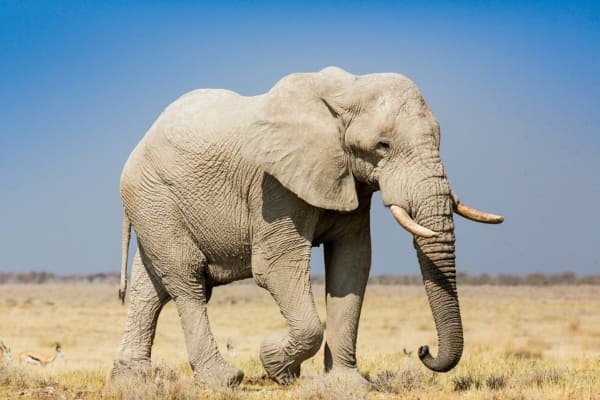Africans hold elephants in high esteem. From the Zulu in the south to the Berbers in the north, people all over Africa regard elephants as symbols of power ad strength.
Some African cultures also adore elephants for their size, stamina, loyalty, longevity, cooperative spirit, and mental faculties.
Generally, every African culture sees elephants in its own way, and that’s why each language has unique names for them.
Check these 11 interesting African names for elephants and discover more about these adorable, giant creatures:
1. Indlovu
Indlovu is the popular word for elephant in Zulu. The Zulus derived this name from the verb dlovu, which translates to overturning or crashing.
Indlovu doesn’t only mean the elephant’s massive size and power but also symbolizes resilience, strength, and power in the Zulu culture.
Zulu people admire elephants’ strong family bonds, impressive memory, and matriarchal societies.
The Zulu kingdom’s coat of arms features the elephant head to symbolize power.
2. Ndovu
The Swahili word for elephant is Ndovu. Swahili speakers derive the word from a popular Bantu word, Njogu, which means an elephant.
Swahili nations also refer to the massive creature as Tembo, although Ndovu is the most famous word for the African elephant.
Swahili people use the word Ndovu to refer to female and male elephants since it is gender-neutral.
Swahili poems, traditional stories, and art depict the elephant as a strong, intelligent, and wise creature.
3. Giwa
Giwa means an elephant in the Hausa language of West Africa. It describes the African elephant by its impressive features, including enormous size, two long tusks, and a trunk.
The African elephant has an iconic status in the Hausa culture. Giwa features in Hausa religion, culture, art, and folklore.
The Hausa and many other African ethnic groups see elephants as symbols of prosperity, luck, vitality, and memory.
4. Erin
Erin means elephant in the Yoruba language.
Like other African cultures, elephants have immense significance in the Yoruba culture. The word Erin means more than the elephant’s impressive physical appearance. Elephants resonate with the Yoruba symbol of power, whereby these creatures represent authority and strength.
Erin has a spiritual significance in Yoruba beliefs as well. Yorubas see the creatures as links between the physical and spiritual world.
5. Njovu
Njovu means elephant in Tsonga. The Tsonga people are native to South Africa and southern Mozambique.
Njovu symbolizes physical might, wisdom, and leadership in the Tsonga culture. Elephants hold a special place in Tsonga spirituality, as they are considered spiritual guardians by the Tsonga people.
6. Nganda
Nganda means elephant in the Lingala language of Central Africa. The word Nganda also symbolizes wisdom and strength within the Lingala culture. Prosperity and fertility are also cultural symbols of elephants in Lingala. Many Lingala proverbs feature the word Nganda in various contexts.
You may want to check: 33 African Proverbs about Strength (with Explanations)
7. Nzou
Nzou means elephant in Shona. The Shona people of southern Africa refer to the elephant by its trunk rather than size and strength.
Shona culture depicts the elephant as a resourceful and adaptable creature based on how it uses its trunk to perform many tasks.
An elephant trunk also symbolizes knowledge and wisdom among the Shona people. Nzou appears in many forms of Shona art, including sculptures, pottery, and carvings.
8. Enjovu
Enjovu means elephant in the Baganda language. It is a famous symbol among Uganda’s Baganda people and symbolizes strength, fertility, and resilience.
The word also means a giant, highlighting the colossal size of the African elephant.
Like the Shona people, Enjovu appears in Baganda art through barkcloth paintings, sculptures, and carvings.
9. Njogu
Njogu is the Kikuyu word for elephant. In Kikuyu, Kenya’s most widely spoken native language, Njogu means something heavy. In Kikuyu culture, Njogu represent power, strength, wisdom, and leadership.
10. Enyi
Enyi means elephant in Igbo. In Igbo, Enyi is used to refer to something big or a giant, depicting an elephant’s colossal size.
The word has great cultural significance among the Igbo. For instance, Igbo stories depict the elephant as a mythical creature full of strength, spiritual guidance, and wisdom.
11. Oldome
Oldome means elephant in Maa, the official language of the pastoralist Maasai people of Tanzania and Kenya. It means the big one. Oldome highlights the vast size and power of an elephant. It’s the Maasai’s symbol of power and strength.
Other African Words You Should Know:
Africa has the largest population of elephants of all the continents. Elephants are a treasure trove of wildlife species with invaluable cultural significance to the continent alongside its people. The many interesting African names for elephants show just how special these massive creatures are to the inhabitants of the motherland.

